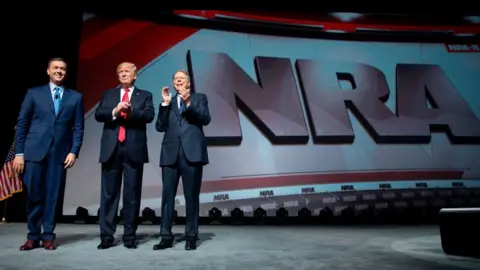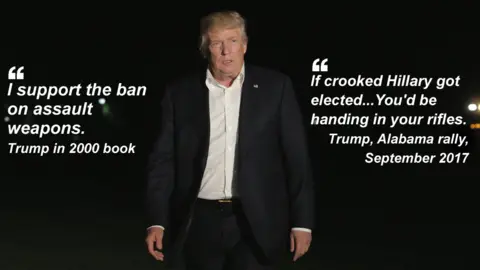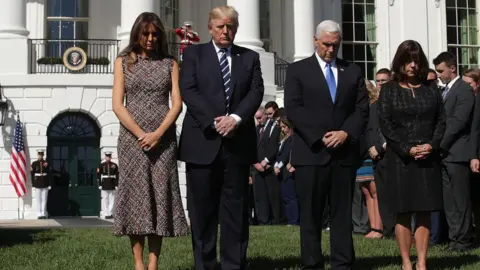How Trump turned against gun control
When attempting to interpret Donald Trump's statements on firearm regulation, and how they could shape a presidential policy response to the Las Vegas mass shooting, the key is to note when he said them.
As with many of his political opinions, Mr Trump's views on gun control have shifted to the right over the years.
In the 1990s and early 2000s, Mr Trump expressed support for a ban on so-called assault weapons - long rifles with military-style features to more easily fire multiple rounds.
"I generally oppose gun control, but I support the ban on assault weapons and I support a slightly longer waiting period to purchase a gun," he wrote in his 2000 book, The America We Deserve.
In 2012 Mr Trump praised Democrat Barack Obama's call for more firearm regulation after the shooting at a Newtown, Connecticut, school that claimed 26 lives, including 20 children.
Conservative bona fides
As Mr Trump began more seriously contemplating a bid for the Republican presidential nomination, however, his views on gun control changed. By the time he announced his entry into the race in 2015, he was well within the mainstream of the Republican Party, which viewed most forms of additional gun regulation as a violation of Second Amendment constitutional protections.
It was Mr Trump's way of establishing his conservative cultural bona fides - proving that he wasn't the big-city liberal he had at times seemed.
In an October 2015 Republican debate, for instance, he boasted that he carried handguns "a lot" and said government-mandated gun-free zones in places like schools, churches and military bases were a "catastrophe" and made for "target practice for the sickos".
Mr Trump would frequently say the answer to mass shootings was having more citizens with firearms - contending that the death toll in the Paris and San Bernardino attacks would have been much lower if bullets had been going "both ways" - towards the victims and the assailants.
The NRA's man
 Getty Images
Getty ImagesTo the surprise of many, Mr Trump secured the endorsement of the National Rifle Association in May 2016, at a time when some Republicans were still uncomfortable with the New Yorker as their presumptive nominee.
"Now is the time to unite," NRA Executive Director Chris Cox said at the time. "If your preferred candidate got out of the race, it's time to get over it."
From then on Mr Trump - in his statements and on his campaign website - largely echoed the NRA's hard line on firearm issues. The group would end up spending more than $30m (£22m) to support Mr Trump's presidential bid.
During the general election, Mr Trump attacked Democrat Hillary Clinton as being in favour of stringent gun control and pledged that he was the candidate that would protect the rights of the estimated 55 million Americans who currently own firearms.
There was one moment during last year's campaign, however, when Mr Trump did break with the NRA's line. After the Orlando nightclub shooting in June, he appeared to endorse limiting gun purchase for national security purposes.
"I will be meeting with the NRA, who has endorsed me, about not allowing people on the terrorist watch list, or the no fly list, to buy guns," he tweeted.
Nothing came of that meeting, however, and as president Mr Trump appears to have made little effort to follow through on it.
'If crooked Hillary got elected...'
Mr Trump's only significant action on guns as president has been to sign a law rolling-back Obama-era limitations on the ability of those being treated for mental illness to purchase firearms.
During a recent campaign rally in Alabama, Mr Trump even revisited his old attacks against Mrs Clinton, warning "you'd be handing in your rifles" if she had been elected.
Congress is currently considering legislation that would make it easier for Americans to purchase silencers for their weapons - a proposal Mrs Clinton criticised in a tweet after the Las Vegas attack.
The president, so far, has not commented publicly on the legislation, which was expected to be approved by the House of Representatives but has little chance of passage in the Senate.
 EPA
EPAIf the legislation becomes the centre of post-Las Vegas political controversy, however, it may be difficult for the White House to stay above the fray.
A time to heal
In the meantime, Mr Trump now has the unenviable task of trying to heal the nation after yet another "deadliest mass shooting in modern US history" and explaining what - if anything - he proposes to do to stop future tragedies.
George W Bush's turn came in April 2007, as a shocked nation mourned 32 dead on a Virginia college campus.
Barack Obama had his moment in June 2016, following the Orlando Pulse nightclub attack that left 49 dead.
"This massacre is … a further reminder of how easy it is for someone to get their hands on a weapon that lets them shoot people in a school, or in a house of worship, or a movie theatre, or in a nightclub," he said after Orlando.
"And we have to decide if that's the kind of country we want to be. And to actively do nothing is a decision as well."
No easy answers?
The story of Mr Trump's response is still unfolding. The number of dead has risen to 58, with the estimated number of wounded an astounding, incomprehensible 500.
After tweeting out his "warmest sympathies" to the victims of the Las Vegas shooting on Monday morning, Mr Trump took to the lectern at the White House to deliver a statement heavy on prayers, mourning and calls for unity but light on hints of what comes next.
 Getty Images
Getty ImagesDuring his morning remarks the president said that, in the search for "meaning in the chaos", answers do not come easy.
In coming days and weeks ahead, many answers for how to respond to the bloodshed in Las Vegas will be offered. They're already pouring in from the president's friends and critics.
Many will be policies - often contradictory - that Mr Trump, at one time or another, has supported.
